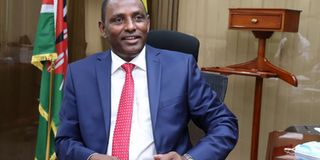Big chance for Yatani to craft legacy with bold policy moves

National Treasury Cabinet Secretary Ukur Yatani. PHOTO | DENNIS ONSONGO | NATION MEDIA GROUP
What you need to know:
- Where Yattani can make a difference is new direction and stewardship in better execution of projects and faster absorption of the budget.
- Yatani will be reading his first budget at a time when the country is on the brink of the worst economic recession in history.
Here are a few points for Treasury Cabinet Secretary Ukur Yatani to ponder as he does the final touches to the budget statement that he is expected to read before the National Assembly tomorrow.
Yatani will be reading his first budget at a time when the country is on the brink of the worst economic recession in history. Although the full economic impact of the coronavirus will take long to be appreciated, it is clear that no sector of the economy has been spared the wrath of the Covid-19 pandemic.
SOLID COMPANIES
Hitherto solid companies that have been growing steadily and turning a profit year in, year out are on the brink of collapse. Yet Yattani has neither the latitude nor the legroom to try anything extraordinary in the plan he will be tabling before the House.
Still, he has an opportunity to make an imprint on the economic policy-making scene by presenting a package of bold decisions to be remembered long after he has left the scene.
In the days of yore, the contents of the budget, mainly documents detailing taxation and expenditure measures, would remain a secret until Budget Day.
But nowadays, the information is put out and debated long before the budget is read. The minister is merely expected to present context and explain the reasoning and thinking that has informed its crafting.
A budget is not just about taxation and spending. The public expects a road map to allow the taxpayer to predict and assess how the economic environment is going to look like in the medium term.
ECONOMIC RECOVERY
Yatani’s predecessor, Henry Rotich, left the scene without leaving behind any significant policy associated or directly linked with him. What we saw is a regime that was risk-averse and where decision makers seemed afraid to experiment with new ideas.
Under President Mwai Kibaki, both the National Treasury and the Ministry of Planning were under a regime that was bubbling with ideas. The Narc administration’s “Economic Recovery for Wealth and Employment Creation” policy document was full of high ambition.
Admittedly, some of the ideas in that document were lofty and impracticable. But we must give it to Narc that the leadership created an environment where policy makers were encouraged to experiment with new ideas. In terms of ambition, Narc raised the bar very high indeed.
REDUCING CASH RATIO
The inclination to try new ideas was evident in the first budget speech of then-Finance minister, the late David Mwiraria, who shocked the money and capital markets by reducing the cash ratio from 10 per cent to six per cent.
The masterstroke brought the interest rate on the 91-day Treasury Bill tumbling from eight per cent in December 2002 to below two per cent in most of 2003 and 2004.
Commercial banks that had long abandoned lending to the people during the Moi regime by concentrating on lending to the government had to change the business model.
Tomorrow, it will be Yatani’s turn to do something bold. We will want to see his plan for navigating the economy in the post-pandemic period.
Our economy was struggling even before the advent of Covid-19. Yet, it still possesses innate strengths built around the depth of its private sector, education levels of the country’s population, basic physical infrastructure and the geographical location of the country as the economic hub of the region.
With the right and enlightened leadership, it is an economy that can run on autopilot. It is prevented from exploiting its full potential by bad politics and a dysfunctional civil service.
Where Yattani can make a difference is new direction and stewardship in better execution of projects and faster absorption of the budget.
The government’s record when it comes to completion of projects on time and absorbing the allocated funds within the financial year has been appalling.
STALLED PROJECTS
Last year, we were all shocked when the National Treasury tabled a long list of stalled projects before the National Assembly.
To make matters worse, we have county governments whose record at accumulating stalled projects is deplorable. That is why the problem of accumulation of pending bills never ends.
For the budget process to be effective and seen to work, both the national and county government must demonstrate capacity to deliver big projects quickly and at a low cost.
Within this region of Africa, only the government of Ethiopia has demonstrated a good record of delivering large projects on time and within budget. It is no wonder that we have contracted the Ethiopians to sell to us a lot of electricity.
We used to have very few supplementary budgets in the past. The reason why we have many nowadays is our lack of capacity to execute projects within the stipulated timeframes.





